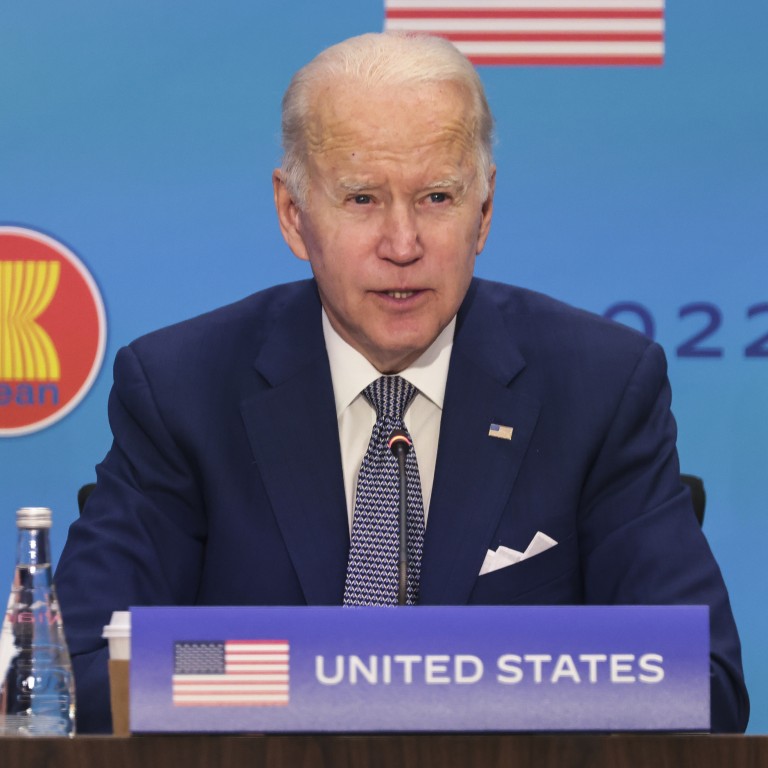
As China, US vie for influence, Asean states put their own needs first, experts say
- Washington is renewing its interest in Southeast Asia, declaring a ‘new era’ in relations with the bloc
- Sovereignty is the bottom line of the member states’ engagement with the two powers, observers say
“As we look around the world – all the challenges we’re facing – the Asean-US partnership is critical, I think, to meeting the moment we find ourselves in history right now,” US President Joe Biden said on Friday as he hosted Asean leaders in Washington.
‘External forces’ meddling in South China Sea, Chinese official says
Washington’s renewed interest in Southeast Asia comes after years of engagement by Beijing via trade, infrastructure projects and pandemic control measures.
Drew Thompson, a visiting senior research fellow at the Lee Kuan Yew School of Public Policy at the National University of Singapore, said it was too simplistic to say Asean countries were caught between China and the US.
“The US has given them choices, and they’re not exclusive ones,” Thompson said of the 10 Asean countries.
“And I think in many cases, China would certainly say that they’re doing the same thing: they’re not forcing Asean countries to choose sides.”
He said Asean states had been extracting benefits from their various ties, including those with China and the US, and the “most important variable in their foreign policy is sovereignty”.
“They’re not going to make, for instance, trades with one country or the other, if they violate their very strongly developed sense of sovereignty and the importance of it in their own foreign policy.”
Shi Yinhong, an international studies professor at Renmin University in Beijing, agreed, saying individual needs would determine whether Asean countries chose to engage with the US or China.
“It’s normal competition. It’s about exploring opportunities and effectively using them, but there’s a premise: you cannot threaten native interests,” Shi said.
“In general, Singapore and Laos tend to be more consistent in their ties with China, but other Asean countries are more fluid.”
Shi also said China seldom reacted strongly to the foreign policy decisions of Asean countries unless they touched on Beijing’s sovereign claims over Taiwan and the South China Sea.
Nevertheless, there has been concern in the region about China’s military build-up, particularly in the South China Sea, where Beijing’s claims overlap with those of a number of Asean members and Taiwan.
Following the summit, Asean and the US said they would establish an “Asean-US Comprehensive Strategic Partnership” in November.
As part of the deal, the two parties will step up maritime cooperation, including coordination among maritime law agencies to curb illegal fishing, and ensure freedom of navigation over the South China Sea – a frequent source of friction between Washington and Beijing.
The US is not a claimant but it has long deployed military aircraft and vessels to the resource-rich waters for “freedom of navigation operations” – which China sees as violating its sovereignty.
Although it says it welcomes constructive American efforts in the region, China is sceptical of US involvement, fearing the emergence of a Washington-led Nato-style bloc in Asia.
Speaking to Cambodian Foreign Minister Prak Sokhonn via video link last weekend, Chinese Foreign Minister Wang Yi said Asian countries should resist efforts to “bring a cold war mentality into this region and incite confrontations between camps”.
US offers US$150 million development package to Asean on first day of summit
The US and Asean also plan to strengthen economic ties, and cooperate on infrastructure, blockchain applications, digital financial services and climate change – plans underwritten by a US$150 million commitment from the United States.
Evan Feigenbaum, vice-president for studies at the Carnegie Endowment for International Peace, said despite its US$150 million pledge, the US had yet to work out how it can be a “standard setter” in crucial areas such as the digital economy and emerging technologies.
“The real issue is the United States has forgotten its traditional role as a standard-setting nation,” he said, adding that what Asean countries really wanted was access to American markets.
“I do not think it has to be a trade agreement, but I do think the United States needs to figure out what kind of role it wants to play.”
Asean leaders’ summit to include talks with top US political, business figures
Pang Zhongying, an international relations professor at Ocean University, said the US had to resolve a potential conflict between its global leadership and Asean centrality – the idea that the bloc should be the driver of cooperation in the region.
Another challenge for the US would be to convince Asean countries to impose sanctions on Russia.
Pang said Asean’s “silent majority” – all members except Singapore – had declined to sanction Moscow because of close ties with Russia or China.
The US-Asean statement did not mention Russia or its invasion, but it did call for “respect for sovereignty, political independence, and territorial integrity”, “immediate cessation of hostilities” and “the facilitation of rapid, safe and unhindered access to humanitarian assistance for those in need in Ukraine”.



